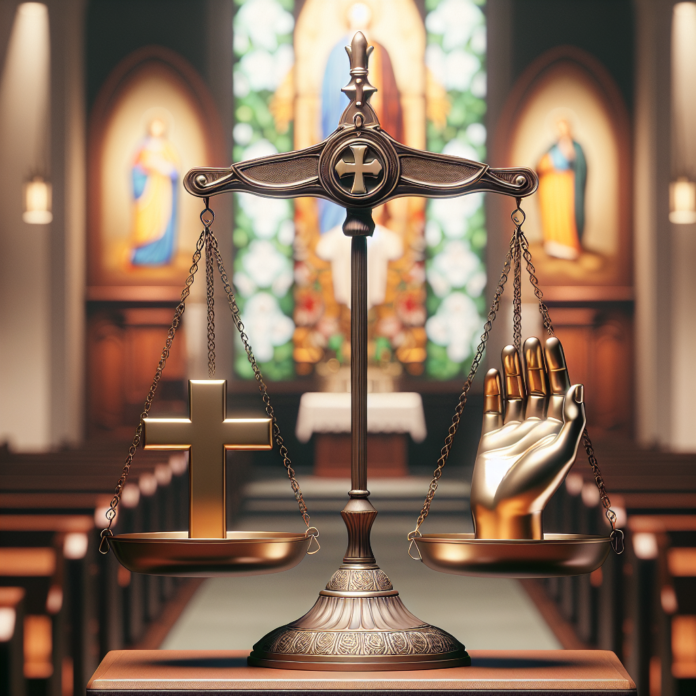Religious Freedom vs. Discrimination: A Catholic Perspective
Religious freedom is a profound and essential element of many societies worldwide, including those with a Christian majority like the United States and many European countries. As a cornerstone of democratic values, it fosters an environment where diverse beliefs can coexist. However, throughout history and into the present day, the interpretation and application of religious freedom within the Catholic Church have sometimes intersected controversially with issues of discrimination. The tension often arises between traditional Catholic conservatism and more progressive, inclusive interpretations of faith.
To understand this dynamic, it is essential to examine the historical roots of Catholic conservatism. The Latin Mass, also known as the Tridentine Mass, is central to this traditionalist view. Codified in 1570 during the Council of Trent, it established a uniform liturgical practice reflecting a singular interpretation of Catholicism. This one-size-fits-all approach to worship, while fostering unity, often left little room for individual expression or adaptation to the cultural contexts of different congregations.
In recent decades, the Catholic Church has faced internal debates over this one-dimensional grasp of tradition versus a more inclusive understanding of religious expression. Pope John XXIII’s call for the Second Vatican Council in 1962 marked a significant shift as the Church sought to engage more deeply with the contemporary world. The progressive reforms forged by Vatican II aimed to address this rigidity, advocating for the liturgy to be celebrated in vernacular languages instead of solely in Latin and encouraging active participation from the laity.
This openness aimed to bring the Church closer to the people, reflecting the changing dynamics of modern society. However, it also amplified the voices of those calling for a return to tradition, arguing that such changes could erode the true essence of Catholic worship. Critics of these reforms often assert that the traditional Latin Mass contains an unmatched theological depth, suggesting that Vatican II’s changes lead to a dilution of sacredness.
Yet, it is crucial to recognize that resisting these progressive reforms has inadvertently contributed to discriminatory practices within certain Catholic circles. By clinging to traditionalism without accommodating for evolving societal norms, there emerges a tendency to exclude those who do not fit the rigid framework — whether they be divorced individuals, members of the LGBTQ+ community, or women seeking larger roles within the Church. The insistence on Latin — a language inaccessible to many — as the universal medium for worship symbolizes a privileging of outdated formalities over genuine inclusivity and understanding.
The teachings of Christ emphasize love, acceptance, and compassion, core values that resonate with progressive calls for a more open-minded approach to faith. While traditionalism has its place in preserving the rich history and heritage of Catholicism, a progressive mindset presents an opportunity to align religious practices more closely with these Christian tenets. It nudges the Church towards an understanding that embraces diversity and champions human dignity.
Pope Francis, in his tenure, has leaned into this progressivism by endorsing a Church that listens and adapts. His vision for the Church’s role in people’s lives underscores dialogue, mercy, and pastoral care over strict adherence to doctrine. In his encyclical "Fratelli Tutti," he emphasizes the concept of “social friendship” and the dismantling of barriers that divide humanity. This ethos mirrors Christ’s life and works, which often broke with the religious dogma of his time to reach the marginalized and the oppressed.
Moreover, history has shown the detrimental impacts of unchecked traditionalism. The Inquisition, with its roots in preserving doctrinal purity, ultimately led to persecution and discrimination. This historical precedent serves as a potent reminder of the perils of an exclusionary approach that prioritizes religious formulas over compassion and understanding. The echoes of such discriminative tendencies can still be heard today when certain factions within the Church resist reforms aimed at creating a more inclusive environment.
In essence, the debate over religious freedom and discrimination within Catholicism often pivots on this nuance between traditionalism and progressivism. Embracing progressive values does not necessitate the abandonment of Catholic traditions; rather, it offers a path towards interpreting these traditions in ways that enrich faith and community life in today’s diverse cultural landscape.
By fostering a culture of inclusivity, rooted firmly in the love and teachings of Jesus, the Catholic Church can navigate these complex issues of religious freedom and discrimination. It can evolve as an institution that upholds the sanctity of tradition while courageously addressing the needs and struggles of its modern congregants. In doing so, it finds an authentic expression of faith that honors the past without excluding the present or the future.
This progressive outlook is not merely a departure from tradition but an expansion of it, offering a vision of Catholicism that is universal in a truly contemporary sense. Such a perspective embodies a Church where the essence of Christ’s message shines through, promoting unity and love across diverse experiences and identities.
